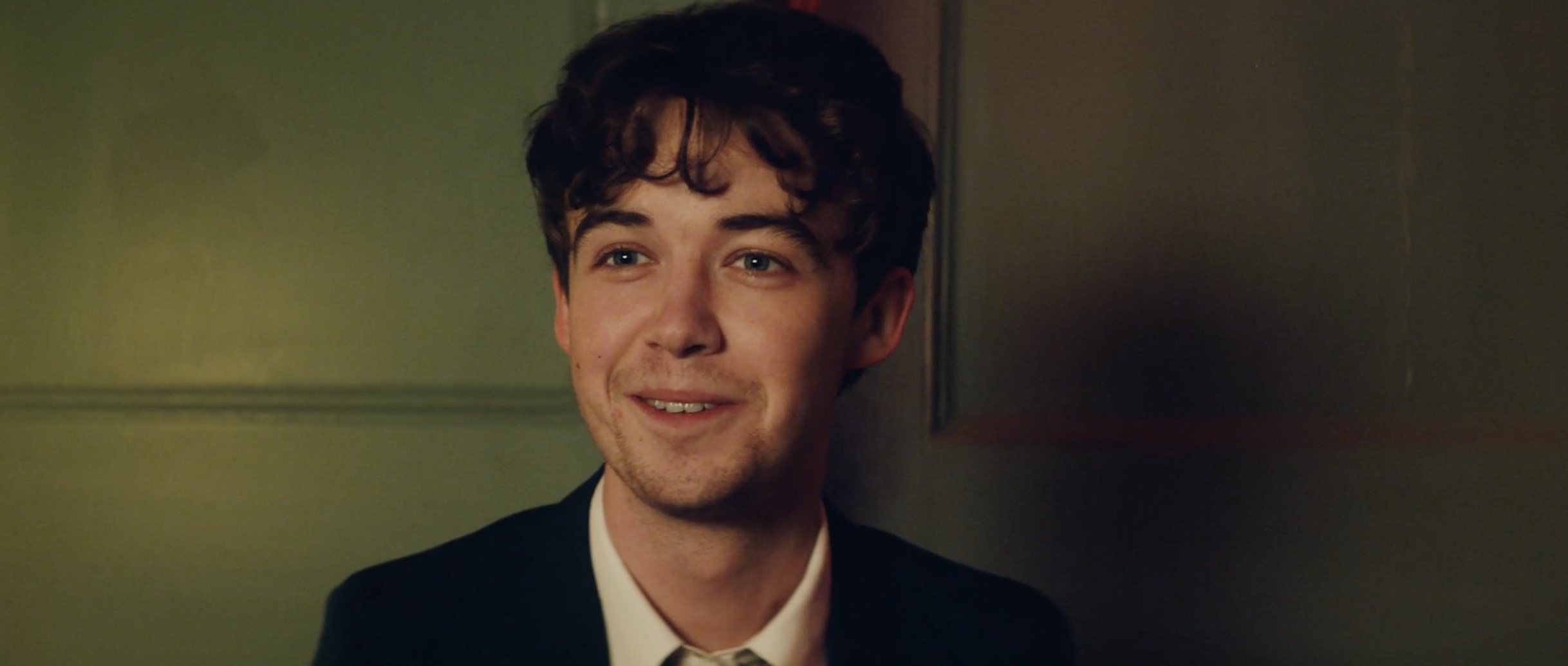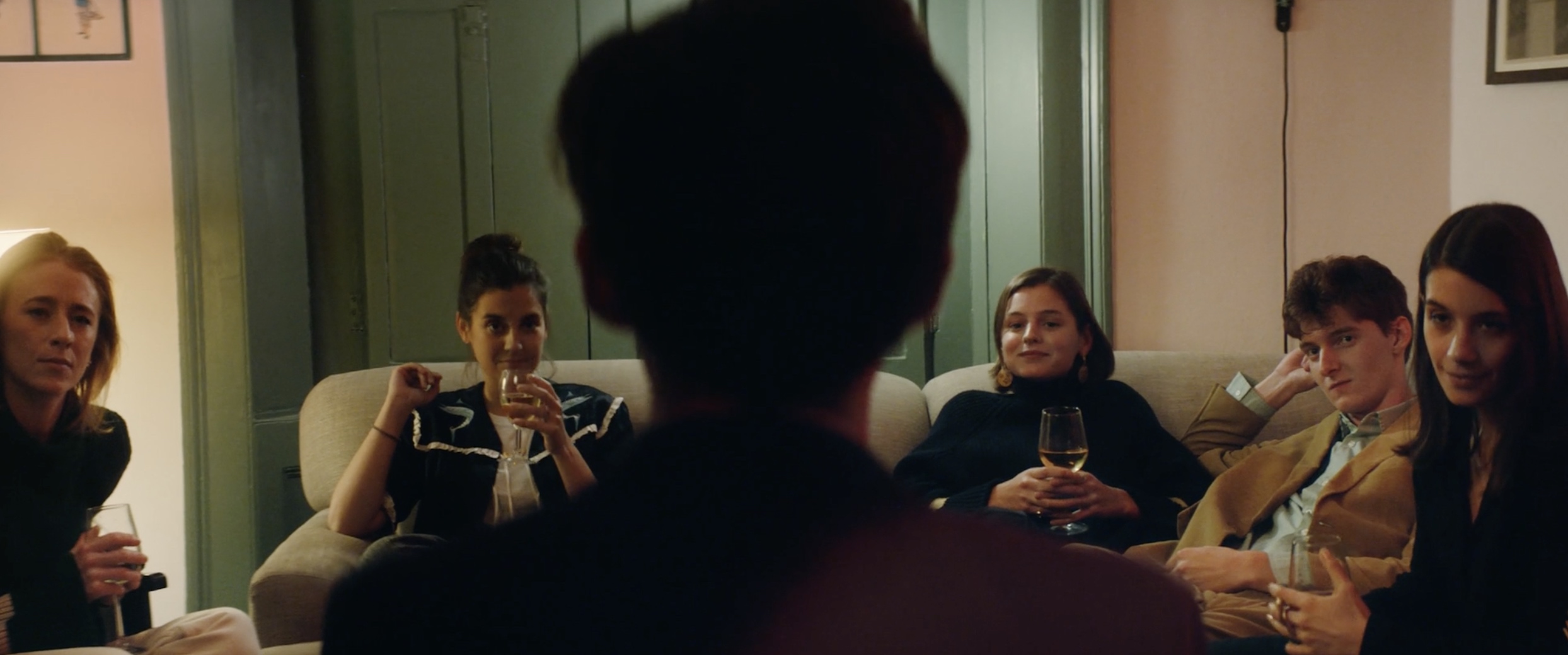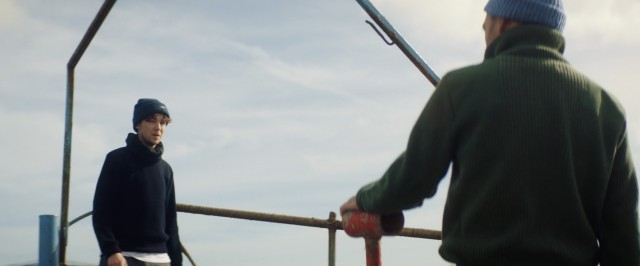A winsomely odd story about social anxiety and the transcendent meaning of dreams, Jack Cooper Stimpson’s debut narrative short Alex’s Dream is a charming comedy with its heart in the right place. Following titular 20-something Alex, as he finds himself overdressed at a private party, he stumbles through a series of slightly surreal situations, always unsure of what to do with himself. The awkward humor of the interactions are perfectly captured by Alex Lawther’s (The End of the F***ing World) pleasantly neurotic lead performance, as we find ourselves strangely immersed in this world of first-time meetings and stunted conversations.
Reluctantly answering his friend Archie’s “call to action” – to help him out with a girl (Emma Corrin, The Crown) – we join our insecure hero as he’s introduced to the other party guests and eventually persuaded to share a personal tale from his subconsciousness. He’s feeling out of his depth, but at least he can always rely on the simple, but profound wisdom of the “talking“ dog he just met…
Alex’s Dream is impressive for many reasons, but one of the first things that stands out in the short is its impressive cast. Lead actor Alex Lawther made a name for himself in the Netflix series The End of the F***ing World and has also appeared in an episode of Black Mirror and films including The Imitation Game and Goodbye Christopher Robin. While fellow party-goers include a room full of on-the-rise British acting talent, most notably Emma Corrin, appearing on-screen two-years before she’d grab headlines as Princess Diana in Series Four of The Crown.
“It’s nice to film a whole story in a day”
Asked about his involvement in Alex’s Dream and the difference between working on a low-budget short and a TV show, Lawther explains that “there isn’t an awful lot of difference between the mediums”, adding that “sometimes it’s nice to film a whole story in a day — and sometimes it’s nice to spend months with that story.”
In our interview with writer/director Stimpson, the filmmaker admits that it was certainly a bonus to have well-known faces in his short, in terms of getting attention, but he was also keen to point out that the most important aspect is whether each actor is right for the role. Stimpson knew that Lawther had the right sensibility for the character, labelling him a “wonderfully sensitive and precise actor”, before adding that he thinks “he’s so good at balancing the comedy of the film with the wacky kind of dream scape of it.”

“There’s a feeling that you want to be part of telling this story”, Lawther on why he was drawn to Alex’s Dream.
There’s a certain “quirkiness” to Alex’s Dream, which Stimpson manages to convey in a way that lends the short a unique sensibility, The framework of the film itself is a familiar story about young people at a party, but the trick is that in-between this classical structure, most situations and interactions feel ever so slightly left of center. As Stimpson admits, the plot “starts off almost formulaic. We [think we] know how this is gonna go. He walks in with his best friend, his best friend wants to talk to a girl, we think that the girl is going to become a big part of the narrative, and they’re going to sort of fall in love” – until things take an unexpected turn.
“You can afford to take risks and be expressive with the world you’re creating”
Alex’s Dream eventually leaves the viewer with more questions than answers but in a good way. It invites us to reflect for ourselves and maybe even think about the last dream we weren’t able to shake, even though it might not be clear what it exactly meant.
“I think I’m naturally quite drawn to films and ideas that don’t quite add up or don’t feel the need to resolve everything for an audience”, Stimpson explains. “It’s also the joy of making short films, that by their very nature you can afford to take risks and be expressive with the world you’re creating.”

Lillie Flynn, Camille Ucan, Alex Lawther, Emma Corrin, Sam Haygart and Olivia Popica in Alex’s Dream
Putting its audience in the shoes of Alex, the person at the party who is too anxious to make deeper connections, until he opens up in an honest and intimate way, will make Alex’s Dream an empathetic watch for many of us. Before that moment, he seems to be strangely detached from his surroundings and is visibly uncomfortable in his own skin. Then again, who among us has never felt what it’s like to be lonely among other people?
“Alex’s Dream doesn’t immediately present itself as a film about mental health”
In effect, Alex’s behavior, and the film’s underlying nervous energy, genuinely reflect the anxiety and (adolescent) angst of someone who’s neither at ease with himself or with what’s going on around him. But I think if there’s anything we can relate to in this year 2020, it is the existential dread of a crooked normalcy – still recognizable, but tilted.
One of the things I personally admire about Alex’s Dream is how it deals with the topic of mental health without being about mental health, per se. The film captures the problems at the macro level by telling an intimate, slice-of-life story. “I’m aware that Alex’s Dream doesn’t immediately present itself as a film about mental health,“ says Stimpson. “But I think I kind of came to the realization afterwards that there’s actually a lot about male insecurity, male anxiety, male relationships and a lot of my own feelings, like very personal things I’ve just sort of accidentally put into the film.“

“It was a lovely thing working with a close friend” – Lawther’s relationship with Stimpson, began when they met on Old Boys
For filmmakers who want to make films about issues such as mental health, without stumbling into on-the-nose, PSA-like territory, writer/director Stimpson shares his own learnings on what one might want to consider when writing scripts with a similar angle: “Every character has a mental health – so maybe that’s a fantastic way of thinking about it. And just acknowledging that maybe one of your characters might be less than okay, right now. […] So when you’re writing a character, you should be thinking about their mental health and where that lies on the kind of spectrum of it.”
“It’s a fantastic opportunity to be talking about these issues”
In reality, this adapted way of thinking applies to any topic one is looking to incorporate as a storyteller, not just mental health. The writer/director applied the same method of “filmmaking-as-activism”, as I like to call it, to his latest short Extinction – a narrative film starring Emma Thompson about the climate activist group Extinction Rebellion.
“I think activism through filmmaking, whether it’d be mental health, or the environment, is just a great thing to do”, Stimpson explains as we discuss why he’s drawn to certain themes as a director. “Filmmaking, speaking generally here, has a disproportion of audience for what it is. It’s so powerful and it can get such attention, that it’s a fantastic opportunity to be talking about these issues.”
Stimpson is currently developing a BBC series based on that short, together with his writing partner, actor Sam Haygarth (Jojo Rabbit, The French Dispatch), who plays Alex’s lovelorn friend Archie. Considering the technical skill and vulnerable warmth of Stimpson’s storytelling abilities, evident in Alex’s Dream, and given the promising outlook of his Extinction series project, I am sure we will be hearing a lot more from this filmmaker in the future.

 Georg Csarmann
Georg Csarmann